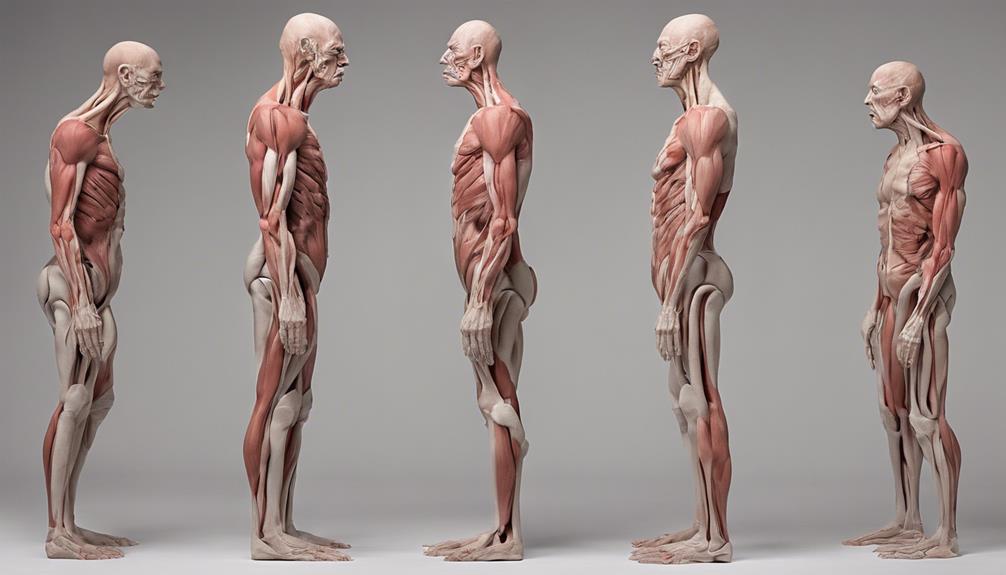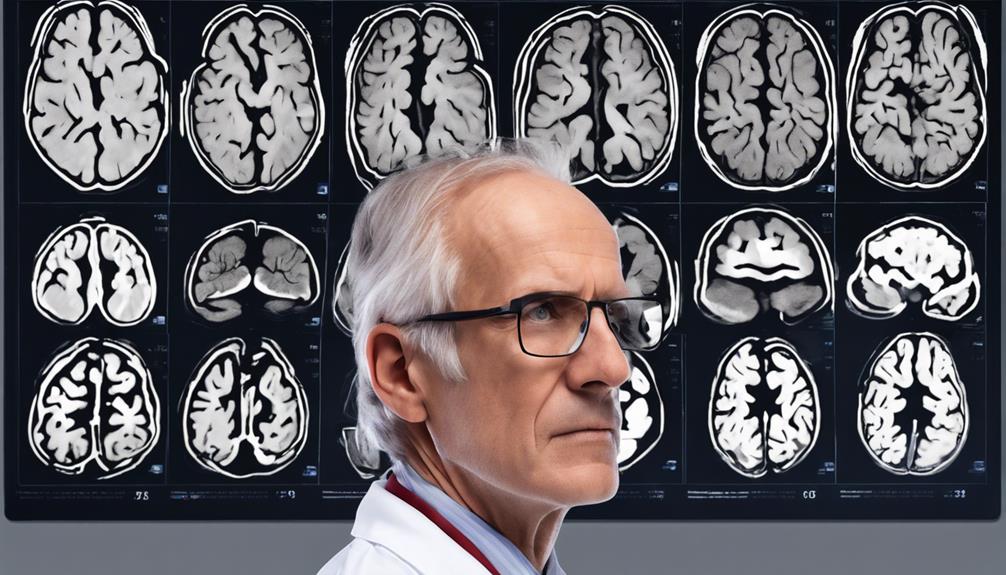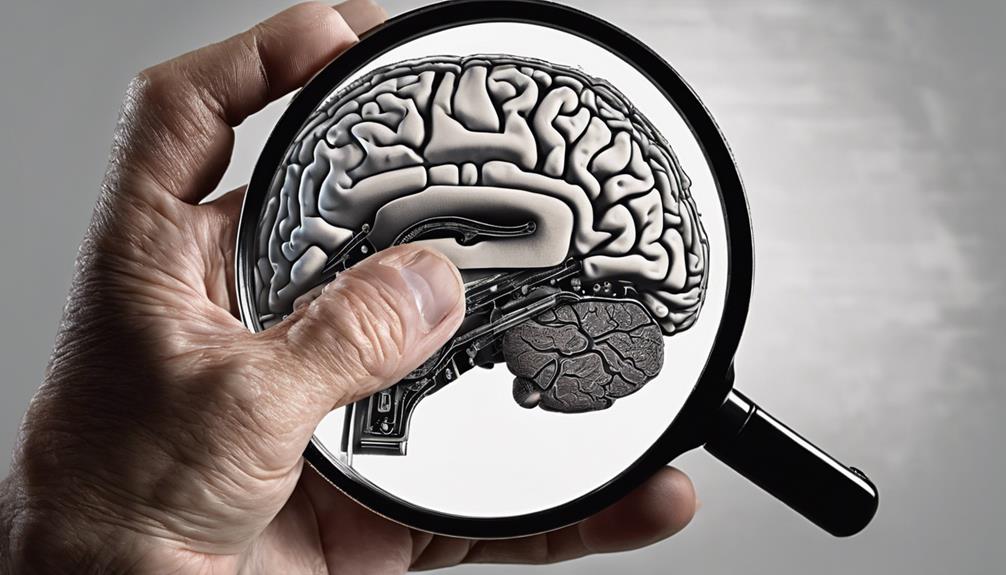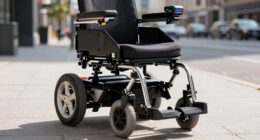In the advanced phases of Lewy body dementia, prominent signs such as memory loss, confusion, and challenges in decision-making start to surface. Hallucinations, paranoia, and motor symptoms like tremors become more evident. Behavioral changes such as aggression and agitation may manifest alongside difficulties with swallowing and increased risk of infections. Caregivers need to prioritize comfort and safety, addressing symptoms through hospice care and emotional assistance. The use of specialized equipment and adjusted medication plans is crucial. These signs indicate the necessity for specialized care and attention. By becoming more informed about these indicators, you will develop a better grasp on how to provide support for individuals dealing with end-stage Lewy body dementia.
Key Takeaways
- Increased cognitive decline leading to severe memory loss and confusion.
- Persistent and distressing hallucinations and delusions.
- Severe motor symptoms like tremors and rigidity affecting mobility.
- Aggressive behavior, agitation, and verbal outbursts escalate.
- Swallowing difficulties with a high risk of aspiration and infections.
Cognitive Decline and Memory Loss
As cognitive decline progresses in end-stage Lewy Body Dementia, individuals experience profound memory loss and confusion. In this advanced stage of dementia, the ability to remember recent events, familiar faces, or even essential personal details becomes severely compromised. Tasks that once seemed simple, like recalling names or following familiar routines, may now present significant challenges. The impact of severe memory loss in end-stage Lewy Body Dementia extends beyond forgetfulness; it can lead to disorientation, difficulty in communicating effectively, and an increased reliance on caregivers for daily activities.
The progression of cognitive decline in advanced dementia stages such as end-stage Lewy Body Dementia can result in a noticeable deterioration in decision-making abilities and problem-solving skills. As memory loss becomes more pronounced, individuals may struggle to make sense of their surroundings or engage in coherent conversations. This decline in cognitive function underscores the importance of providing compassionate support and understanding to those affected by this challenging condition.
Hallucinations and Delusions

Hallucinations and delusions, prevalent symptoms in end-stage Lewy body dementia, greatly impact individuals' perception of reality and behavior. Visual hallucinations, such as seeing people or objects that aren't there, are common and can be distressing. Similarly, delusions involving false beliefs like paranoia can lead to fear and suspicion. As Lewy body dementia progresses, these symptoms often worsen, affecting how individuals understand the world around them and leading to changes in their actions.
Managing hallucinations and delusions in end-stage Lewy body dementia requires a thorough approach. Healthcare professionals, caregivers, and supportive interventions play vital roles in helping individuals cope with these challenging symptoms. It's crucial to create a safe and calming environment, provide reassurance and validation, and guarantee proper medication management under the guidance of healthcare providers. By working together and tailoring strategies to the individual's needs, we can offer essential support and improve their quality of life during this difficult time.
Motor Symptoms: Tremors and Rigidity
Progressing through the advanced stages of Lewy body dementia, individuals may experience pronounced and persistent tremors, affecting their daily activities and mobility. These tremors can make simple tasks like eating, drinking, or writing challenging. Additionally, rigidity in muscles can cause stiffness, making movement uncomfortable and restricted. Both tremors and rigidity are common motor symptoms in advanced Lewy body dementia and can have a major impact on the quality of life of those affected.
In the end stages of the disease, managing these motor symptoms becomes essential. Specialized care that focuses on addressing tremors and rigidity is crucial for providing comfort and maintaining the individual's well-being. This specialized care may involve adjustments in medications, physical therapy to improve mobility, and assistive devices to support daily activities.
Caregivers and healthcare providers play a critical role in monitoring changes in tremors and rigidity to tailor care plans accordingly. By staying attentive to these motor symptoms, they can make sure that individuals with advanced Lewy body dementia receive the necessary support and interventions to enhance their quality of life.
Behavioral Changes: Aggression and Agitation

Managing aggression and agitation becomes essential in providing effective care for individuals in the end stages of Lewy Body Dementia. Aggression and agitation are common behavioral changes in this stage, causing distress for both the person with LBD and their caregivers. Agitation may show through restlessness, pacing, or verbal outbursts, while aggression can include physical violence, yelling, or threats.
Caregivers play an important role in understanding and managing these behaviors. It's essential to approach the individual with empathy and patience, acknowledging their frustrations and validating their feelings. Creating a calm and safe environment can help reduce triggers for aggression and agitation. Techniques such as distraction, redirection, and maintaining a consistent routine can be beneficial. Seeking support from healthcare professionals or joining caregiver support groups can also provide valuable guidance and assistance.
Swallowing Difficulties and Aspiration Risk
Given the challenges of aggression and agitation in end-stage Lewy Body Dementia, it's important to address the significant issue of swallowing difficulties and aspiration risk that can arise in this advanced stage of the disease.
Swallowing difficulties in late-stage Lewy body dementia can lead to aspiration, where food or liquid enters the airway instead of the esophagus. Aspiration risk increases due to weakened swallowing muscles and impaired coordination, making individuals more susceptible to complications. Swallowing problems can result in coughing, choking, chest infections, and pneumonia, particularly aspiration pneumonia, which is a common concern in end-stage Lewy body dementia.
It's essential to monitor and manage swallowing difficulties in late-stage Lewy body dementia to prevent aspiration-related complications, ensuring comfort and quality of life for individuals. Caregivers and healthcare providers play a crucial role in supporting individuals with Lewy body dementia through this challenging aspect of the disease, promoting safety and well-being.
Sleep Disturbances and Urinary Incontinence

Sleep problems, like increased daytime napping and nighttime confusion, are common in those with end-stage Lewy Body Dementia.
Urinary issues, such as incontinence, can also arise due to cognitive decline affecting bladder control.
Managing these symptoms is essential for enhancing comfort and quality of life in individuals facing advanced stages of Lewy Body Dementia.
Sleep Problems in LBD
Experiencing disruptions in sleep patterns and struggles with urinary incontinence are prevalent challenges faced by individuals with Lewy body dementia (LBD). These issues can have a substantial impact on the quality of life of both the affected individual and their caregivers. Here are some key points to keep in mind:
- Sleep disturbances: Insomnia, excessive daytime sleepiness, and disrupted sleep patterns are common in LBD.
- REM sleep behavior disorder: Acting out dreams, talking, or moving during sleep can occur, posing safety risks.
- Urinary incontinence: Affects over 50% of individuals with advanced LBD, leading to challenges in managing bladder control.
Addressing these challenges through appropriate management strategies is essential for enhancing overall well-being and quality of life.
Urinary Issues in LBD
Frequently observed in individuals with Lewy body dementia (LBD) are urinary issues, especially urinary incontinence, which arises from disruptions in the brain's bladder control functions. LBD patients may also experience REM sleep behavior disorder, contributing to sleep disturbances. Nocturia, the frequent need to urinate at night, can further impact the quality of sleep for individuals with LBD.
Managing urinary issues in LBD involves strategies like scheduled toileting, fluid management, and adjusting medications. These approaches aim to improve bladder activity and enhance the overall well-being of those affected by LBD. Understanding and addressing urinary incontinence in LBD is essential for maintaining comfort and dignity, emphasizing the importance of holistic LBD management that considers all aspects of the disease.
Increased Susceptibility to Infections

Individuals with end-stage Lewy Body Dementia exhibit a heightened vulnerability to infections due to their compromised immune systems. In this advanced stage of the disease, the body's ability to fight off harmful pathogens is greatly weakened, making individuals more prone to infections. Common infections that affect those with end-stage Lewy Body Dementia include pneumonia and urinary tract infections. These infections can worsen the symptoms of Lewy Body Dementia and contribute to a rapid decline in health. It's essential to monitor for signs of infections and seek prompt medical attention if any are suspected.
Weakened immune systems increase susceptibility to infections.
Pneumonia and urinary tract infections are common in end-stage Lewy Body Dementia.
Infections can accelerate the progression of the disease and require immediate medical treatment.
Caregiver Focus: Comfort and Safety

To enhance the well-being of individuals with end-stage Lewy body dementia, caregivers should prioritize creating a safe and comforting environment. It's vital to make sure the surroundings are free from hazards that could lead to falls or accidents. Implement measures such as removing clutter, securing rugs, and providing support with mobility to enhance safety.
Additionally, focus on maintaining a calm and soothing atmosphere to reduce agitation and distress in individuals with Lewy body dementia. Consider using specialized equipment like cushions or chairs to optimize comfort and positioning, which can make a substantial difference in their daily comfort levels. Regularly assess and address any pain or discomfort the individual may be experiencing to improve their overall quality of life.
Symptom Management in End-Stage

In the care of individuals with end-stage Lewy body dementia, the focus shifts towards effective symptom management to provide comfort and alleviate pain and distress. When managing symptoms in this stage, it's important to prioritize palliative care and pain management to enhance the individual's quality of life.
Here are key strategies for symptom management in end-stage Lewy body dementia:
- Observing Signs of Pain: Caregivers should carefully observe for any signs of pain or distress in individuals with end-stage Lewy body dementia to address their needs promptly.
- Calling Hospice for Support: Hospice care can provide specialized assistance in pain management, adjust medication plans, and offer emotional and spiritual support tailored to the individual's requirements.
- Providing Comfort Equipment: Ensuring the individual has necessary equipment for comfort, such as specialized beds or cushions, can improve their well-being during end-stage care.
Frequently Asked Questions
What Happens in the Final Stages of Lewy Body Dementia?
In the final stages of Lewy Body Dementia, individuals may experience severe cognitive decline, limited mobility, and increased dependency on caregivers. Hallucinations, delusions, and motor symptoms worsen considerably. Swallowing difficulties, behavioral changes, and communication decline are common.
What Are the Signs That Lewy Body Dementia Is Getting Worse?
As we observe the progression of Lewy body dementia, we notice heightened frequency and severity of hallucinations, cognitive decline with significant memory loss, movement difficulties, intensified sleep disturbances, and aggravated mood swings, anxiety, and depression.
What Is the Timeline of the Stages of Lewy Body Dementia?
In Lewy body dementia, the stages vary in duration and progression. Symptoms like cognitive decline, hallucinations, and movement issues manifest differently. Understanding each stage aids in treatment decisions and care planning, allowing for tailored support.
What Is Palliative Care for Lewy Body Dementia?
Palliative care for Lewy Body Dementia focuses on improving quality of life, managing symptoms, and providing emotional support. It aims to enhance comfort, reduce suffering, and maintain dignity in end-stage LBD, involving a team of healthcare professionals to address holistic needs.
Conclusion
In summary, when caring for someone with end-stage Lewy body dementia, it's important to be aware of the key indicators of the disease.
Remember, like a puzzle with missing pieces, each symptom plays a vital role in understanding the progression of the illness.
By recognizing these signs and addressing them promptly, caregivers can provide the necessary support and comfort to their loved ones during this challenging time.









